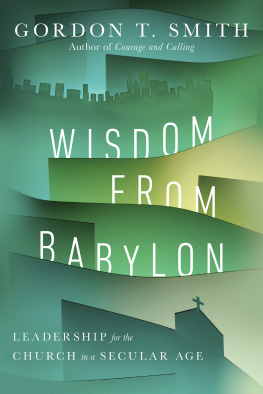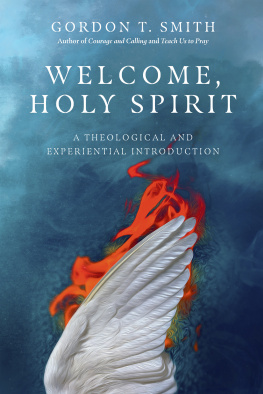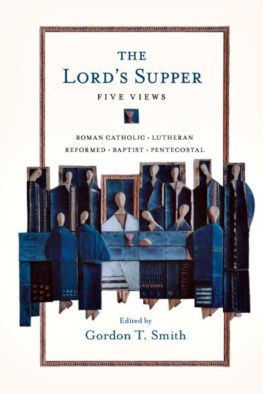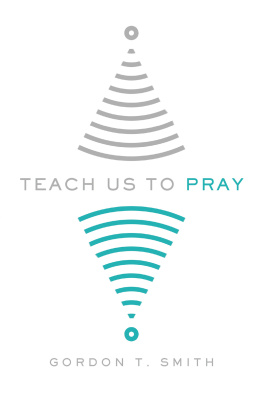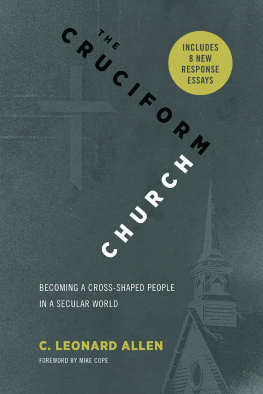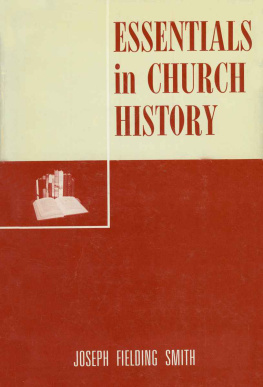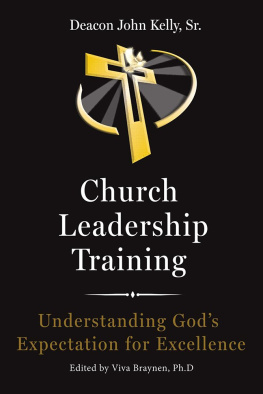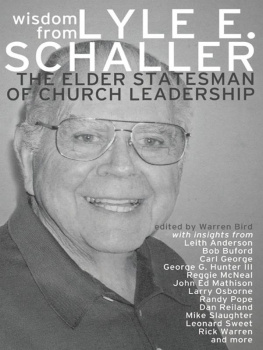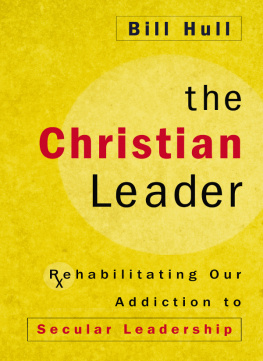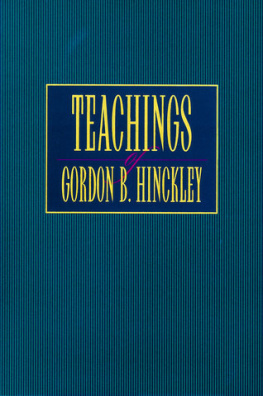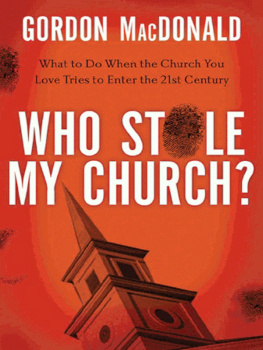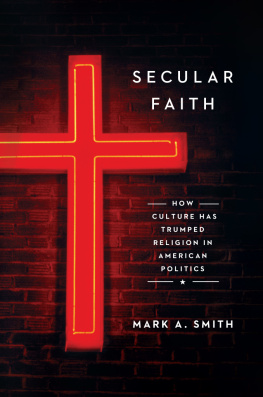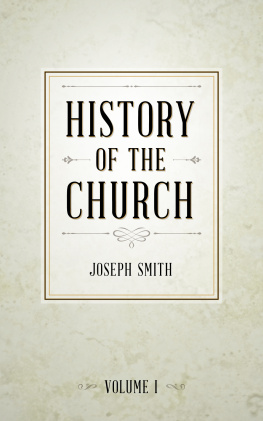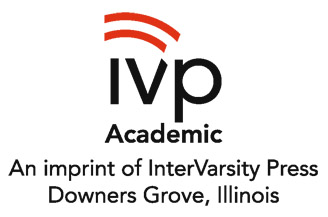Sommaire
Pagination de l'dition papier
Guide
WISDOM
FROM
BABYLON
LEADERSHIP for the
CHURCH in a SECULAR AGE
Gordon T. Smith
InterVarsity Press
P.O. Box 1400, Downers Grove, IL 60515-1426
ivpress.com
2020 by Gordon T. Smith
All rights reserved. No part of this book may be reproduced in any form without written
permission from InterVarsity Press.
InterVarsity Pressis the book-publishing division of InterVarsity Christian Fellowship/USA, a movement of students and faculty active on campus at hundreds of universities, colleges, and schools of nursing in the United States of America, and a member movement of the International Fellowship of Evangelical Students. For information about local and regional activities, visit intervarsity.org.
Scripture quotations, unless otherwise noted, are from the New Revised Standard Version of the Bible, copyright 1989 by the Division of Christian Education of the National Council of the Churches of Christ in the USA. Used by permission. All rights reserved.
Cover design and image composite: David Fassett
Image: curved paper pieces: Paul Taylor / Stone / Getty Images
ISBN 978-0-8308-5327-4 (digital)
ISBN 978-0-8308-5326-7 (print)
The publisher can't verify the accuracy of website hyperlinks beyond the date of print publication.
This digital document has been produced by Nord Compo.
for joella
INTRODUCTION
THE TIMES THEY ARE A-CHANGIN
If your time to you
Is worth savin
Then you better start swimmin
Or youll sink like a stone
For the times they are a-changin.
BOB DYLAN, THE TIMES THEY ARE A-CHANGIN
EFFECTIVE LEADERSHIP FOR THE CHURCH requires the capacity to read the timesto have some understanding of the social, cultural, and economic context in which the church is located. And then, with this insight, it is necessary to cultivate the competencies and dispositions that will provide appropriate guidance for the church in that time and that place.
This means we need to think very intentionally about theological education and formation for leadership to assure that it is consistent with the timesthat is, that we are thinking about the ways in which our approach to cultivating leadership equips women and men to lead effectively in the world in which we actually live, our circumstances as they present themselves, not as we might wish them to be.
If Bob Dylan is right and the times they are a-changin, then it only follows that we ask: What has changed? What do these changes mean? And how do we respond appropriately and effectively? When it comes to the formation of leaders for the church, we must ask about the competencies needed for church leadershipnot for a previous time, but for this time. And we must also ask about the spiritual dispositions that we need to cultivate if we are going to provide quality leadership in this particular context.
There are universals, of course. In all times and in all places, there are certain capacities that are inherent in what it means to provide pastoral leadership for the church. We can reflect on the life and mission of the church across cultures and recognize that leadership for the church in both Indonesia and Norway will require certain commitments and capacities, even though the cultural and social context may be very different. It is fruitful to read Martin Luther and Francis de Sales and realize that there are common themes for leadership for the church between the sixteenth, seventeenth, and twenty-first centuries. And yet we need to be particular to our times and to the social, cultural, political, and economic context in which the church is located. This means that we get beyond any nostalgia or wishful thinking. It means that we honestly and courageously engage the world into which we are called, seeking to ask: For this time and this place, what does it mean to provide effective leadership for the church? What are the competencies and dispositions that are needed?
We urgently need qualified, capable, and mature leadership. This does not happen overnight; it takes time, and there are no shortcuts. Speed is rarely a pedagogical virtue. The church in the secular West is facing a very challenging context. It will take time to nurture and cultivate the kind of leadership that can navigate those challenges. Many denominational bodies are facing a dearth of capable leaders for the church, both clergy and lay. Some speak of this as a crisis, and in response there is a propensity to find a quick solution. But nothing is gained, and much is lost, if we do not appreciate that our circumstances are rather complex and that this has significant implications for the formation of leadership.
What follows, then, is meant to provide input for denominational bodies and theological schools who are thinking about leadership formation. But we also need to recognize that, while leaders are taught and mentored and guided, emerging leaders also need to take personal responsibility for their own formation. They cannot be passive; they need to be intentional and self-directed. These emerging leaders will recognize where there are gaps, perhaps in their own formation or in the curriculum of the theological school in which they are enrolled, and they will find what they need wherever it can be foundin an online program from another school or through a short-term continuing education program or through a field experience. Thus what follows also provides a taxonomy for emerging leaders, asking them to consider: If these are the times in which we live, what are the capacities and dispositions that I need to be cultivating? Further, a congregation might ask a similar question. An elders board might work with the pastoral staff to ask if the cohort of pastoral and lay leaders has the requisite capacities and, if not, whether these will be found through training current staff or hiring someone who brings that capacity to the leadership team.
The primary focus of this book is the church in such places as North America, Australia, and New Zealandthose cultures and societies that are in the midst of the shift to a secular society (on the assumption that most of Europe has already made the shift). Much of what I offer here will no doubt be of value to the leadership for the church in other contexts and settingsfrom Hong Kong and Singapore to Latin America and Africa. But while there are indeed universals, church leaders in each social and cultural context need to ask, for their time and for their place, what it means to provide leadership in their contexteven though, of course, we can and must learn from and with one another. In this case, I am asking: What does it mean to provide leadership for the church in an increasingly secular context?
SECULARITY
AN INTERDISCIPLINARY CONSIDERATION
I GREW UP IN LATIN AMERICA as the child of missionary parents. Every five years we would take a year back in Canada for what was then called furlough, a time to reconnect with supporting churches. That meant living for that year in Belleville, Ontario, near my grandmother. There we would attend the Alliance Tabernacle, my mothers home church. Since then, that church building has been sold and the church community now worships in a newer facility on the outskirts of Belleville. The original building is now a mosque and Islamic center.

